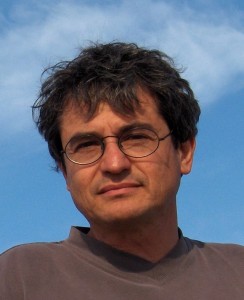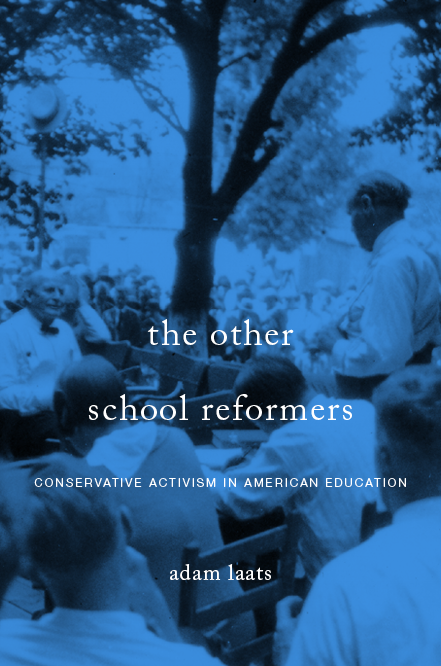Sorry for the overly dramatic headline. But that really is one of the conclusions of atheist mathematician Jason Rosenhouse.
They are not right that the earth is some 6,000 years old. Nor are they correct that humans are the special beloved product of God’s magic touch. But in his book Among the Creationists, Rosenhouse concludes that young-earth creationists are correct that the foundational idea of evolution poses a threat to the very core of Christian belief.

Get your copy today!
Rosenhouse’s book is required reading for any outsider who hopes to understand the world of American creationism in the twenty-first century. Rosenhouse deliberately eschews the simple, satisfying approach of most outsiders. He does not belittle or deride these ideas or their adherents, though he does forcefully argue against them.
As Rosenhouse describes, he is a mild-mannered mathematician with an unusual hobby. For the past several years, he has attended creationist conferences and pored through creationist publications. This experience did not soften Rosenhouse’s intellectual opinion about the scientific illegitimacy of creationism. But it did open his eyes to the galaxy of different types and approaches to creationism. And it convinced him of the overriding need to maintain civility, especially in these difficult discussions.
Indeed, some of the most illuminating parts of the book are the vignettes Rosenhouse includes. In one story (pages 8-11), he describes an impromptu conversation in a Subway restaurant outside of one of the creationist conferences he attended. Rosenhouse overheard a group of Christian creationists—a woman and some teenagers—talking about the strangeness of atheism. He offered his conversational services as a real live atheist. The young people seemed interested and willing to talk cordially. A nearby woman soon interrupted and warned the teenagers away from Rosenhouse, who she suggested had “been educat[ed] beyond [his] intelligence” (10). In the end, though, the Christian busybody warmed up to Rosenhouse and even prayed for him.
Did anyone convince anyone else? No. But was this conversation worth having? I think so. Rosenhouse reported feeling that the adults were occasionally rude in their obvious opinion that he was some sort of “zoo animal” (10). But he also noted that creationists like the ones at Subway almost always remained cordial and even welcoming. Was he likely to convert to creationism or conservative Protestantism? Not at all. But his understanding of the entire dilemma did change in important ways. How about the people he spoke with? Were any of them likely to embrace the obvious truths of mainstream science? Also not likely. But my hunch—and Rosenhouse’s—is that such friendly conversations with a real live atheist do a great deal to keep open the minds of creationists everywhere. As Rosenhouse states, “any hope of doing long-term good comes from being scrupulously polite” (10).
Indeed, Rosenhouse occasionally takes “our side” to task for its own brand of ignorance. As he points out, “Insularity is a two-way street” (15). If some of the ferocious anti-creationists out there took some time to find out more about the real world of American creationism, they would without a doubt be surprised at what they found. For one thing, with a few exceptions, Rosenhouse’s loud-and-proud scientific atheism was welcomed to these creationist conclaves with politeness and even intellectual excitement. Second, creationism is a bigger tent than many outsiders understand. One creationist conference organizer, for instance, complained to Rosenhouse about the “piles of garbage” that passed as scholarship among creationists (14).
Throughout the book, Rosenhouse succeeds at illuminating the intellectual world of creationism. He takes such beliefs seriously, while never granting them legitimacy as scientific ideas. For example, Rosenhouse laments the “tiresome” assumptions of some of his non-creationist colleagues about the biblical beliefs of creationists (43). Rosenhouse carefully explains some of the ways creationists interpret the Bible. The label “Literalism” does not do justice to this tradition. For most creationists—or at least for the “mainstream” tradition of young-earth creationism—passages in the Bible should be taken at their obvious meaning. If something is clearly meant as a parable, it should be read that way. But readers should not add in baroque interpretive schemes to warp the Bible’s clear meaning into more culturally palatable explanations. As Rosenhouse concludes, Genesis really does support a YEC interpretation. There is not much in the text to suggest that these passages were meant to be read as anything but real descriptions of real historical events. More provocatively, Rosenhouse challenges us non-creationists to grant creationists their fair treatment. If creationists’ dismissal of all evolutionary science is absurd, so it is arrogant and self-serving for us simply to dismiss such a widely held belief (159, 167).
For those who have not yet read this book, all this might make it sound as if Rosenhouse fell in love with creationism as he falls all over himself to find the tiniest points of agreement. Nothing could be further from the truth. Rosenhouse never grants the truth claims of creationists. He sternly and repeatedly opposes both their notions and their tactics. For instance, Rosenhouse revisits some of the oldest anti-creationism arguments. Where did Cain get his wife? (164) Why do creationists only insist on some parts of Genesis, and not others? Why, for example, do creationists not insist the earth is flat, with a dome-shaped covering? (163) Just as a literal six-day creation seems to be the obvious interpretation of the Bible’s first lines, so a flat earth is the most near-to-hand interpretation of the text. These old chestnuts, Rosenhouse argues, still have more than enough punch to deflate the most self-satisfied creation scientist. More important, Rosenhouse points out that most creationist science is based on utterly false interpretations of basic concepts. Even worse, creationists often suggest that evolution is only dominant due to a wide-ranging conspiracy, a claim Rosenhouse justly dismisses as pathetic (36).
Yet in spite of his firm opposition, Rosenhouse concludes that creationist reactions to the challenge of evolution are more intellectually respectable than those who try to marry creation and evolution. It makes no sense, Rosenhouse argues, to pretend that evolution does not fundamentally challenge traditional faith (219). Some creationists respond in a way that makes sense; they reject evolution. They may be entirely and sometimes cruelly wrong, Rosenhouse believes, but at least they have recognized the magnitude of the challenge posed to traditional Christian belief by evolution.
So stop reading this tripe and go get yourself a copy of Rosenhouse’s book. For those of you who are creationists or recovering creationists, the volume will give you a sense of how the movement appears to a socially pleasant but intellectually hostile outsider. To us outsiders—liberals, scientists, and others who have only tangential knowledge about American creationism—this book is an absolute must read. It joins other indispensable books in this field, such as Ron Numbers’ The Creationists, George Marsden’s Fundamentalism and American Culture, and Edward Larson’s Summer for the Gods as starting places to understand this durable culture war battlefield.






